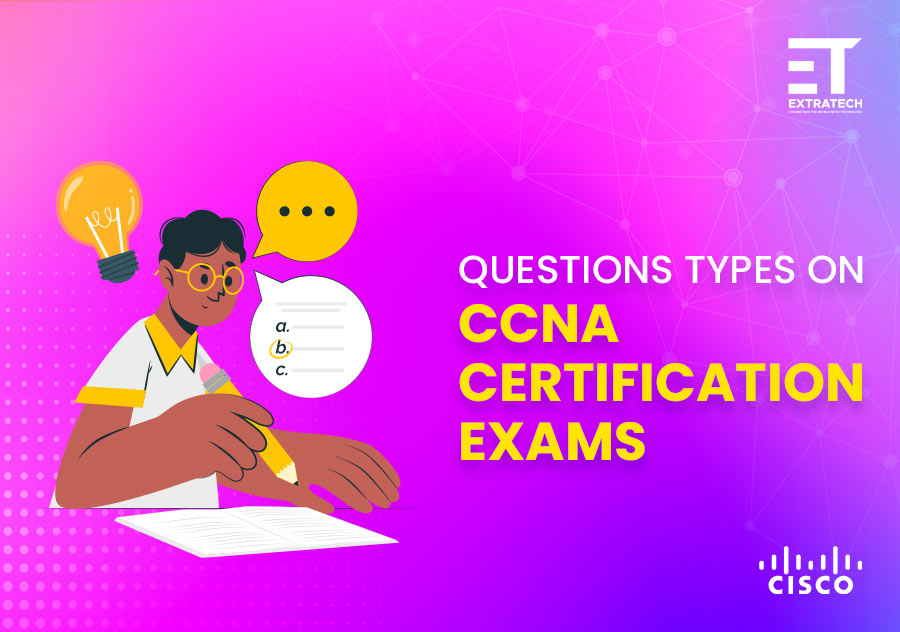


2023-02-03
As a leading provider of networking and IT solutions, Cisco offers a range of certifications that are highly sought after by IT professionals. To obtain these certifications, candidates must take an exam that assesses their knowledge and skills related to the technology or solution. The exams typically include various question types designed to test different aspects of the candidate's knowledge and ability to perform tasks.
In this blog, we will explore the different question types that you might encounter on a Cisco certification exam.
On the Cisco exams, you can expect the following ccna question types:
Multiple choice questions are one of the most common question types on Cisco certification exams. These questions present several possible answers, and you must select the correct one. Multiple-choice questions can range from simple questions requiring you to select the correct answer from a list of options to more complex questions requiring multiple correct answers from a list of options. These questions are designed to test your understanding of the concepts and technologies covered in the exam.
Drag and drop questions are a type of question that require you to arrange the steps or components in the correct order. For example, you might be given a list of steps for configuring a network device, and you must drag each step into the correct order. Drag and drop questions test your ability to understand the sequence of steps required to perform a task and recall the specific commands or steps required.
Simulation questions are a type of question that requires you to perform a task or solve a problem in a simulated environment. These questions provide you with a virtual network environment, and you have to perform a specific task, such as configuring a network device, troubleshooting a problem, or simulating a network scenario. Simulation questions are designed to test your hands-on knowledge and ability to perform tasks in a real-world environment.
Simulation-based multiple-choice questions are a type of question that combine the elements of multiple-choice and simulation questions. These questions present you with a virtual network environment, and you must select the correct answer from a list of options. Simulation-based multiple-choice questions are designed to test your ability to understand the concepts and technologies covered in the exam and perform tasks in a simulated environment.
Fill-in-the-blank questions are a type of question that requires you to fill in missing information to complete a statement. For example, you might be given a sentence with a blank, and you have to fill in the blank with the correct information. Fill-in-the-blank questions are designed to test your recall of specific information and your ability to recall the details required to complete a task.
Router and switch configuration questions are a type of question that requires you to configure a network device such as a router or switch. These questions typically provide you with a virtual network environment, and you have to perform a specific task, such as configuring a routing protocol or setting up a switch. Router and switch configuration questions are designed to test your hands-on knowledge and ability to perform tasks in a real-world environment.
Troubleshooting questions are a type of question that requires you to diagnose and solve a network problem. These questions typically provide you with a virtual network environment and a specific situation, such as a network outage or a security issue. You have to identify the cause of the problem and solve it. Troubleshooting questions are designed to test your ability to diagnose and solve problems in a real-world environment, as well as your understanding of the concepts and technologies covered in the exam.
Scenario-based questions are a type of question that present you with a real-world scenario and ask you to solve a problem or perform a task. For example, you might be given a scenario that describes a network issue, and you have to identify the cause of the problem and provide a solution. Scenario-based questions are designed to test your ability to apply the concepts and technologies covered in the exam to real-world situations, as well as your ability to think critically and solve complex problems.
Short answer questions are a type of questions that require you to provide a short, concise answer to a question. These questions can range from straightforward questions that ask you to define a term to more complex questions that ask you to explain a concept or describe a process. Short answer questions are designed to test your ability to recall information, as well as your ability to communicate your knowledge clearly and concisely.
A CCNA certification expires after three years! Pass one of the following tests before the certificate expiration date to recertify:
You can also recertificate by making 30 Continuing Education (CE) credits. Attending Cisco Live training sessions or completing online training courses can earn you CE credits.
Different question types found on Cisco certification exams are designed to test different aspects of your knowledge and skills related to the technology or solution. It is important to understand the different question types and be familiar with the exam format to increase your chances of success. Preparation, including hands-on experience, study materials, and practice exams, can help you develop the skills and knowledge required to pass and obtain your certification. You can join our CCNA Job Ready Program and get ready for your CCNA examination.